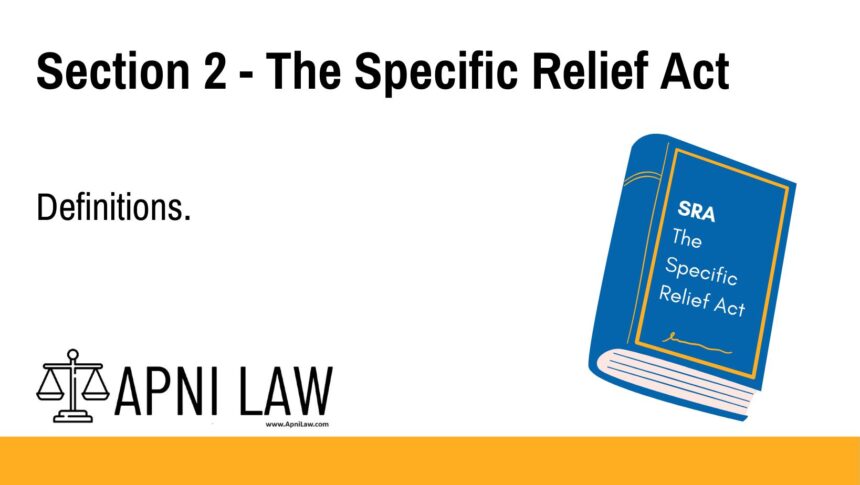Code: Section 2 of The Specific Relief Act, 1963
In this Act, unless the context otherwise requires,—
(a) “obligation” includes every duty enforceable by law;
(b) “settlement” means an instrument (other than a will or codicil as defined by the Indian Succession Act, 1925 (39 of 1925)), whereby the destination or devolution of successive interests in movable or immovable property is disposed of or is agreed to be disposed of;
(c) “trust” has the same meaning as in section 3 of the Indian Trusts Act, 1882 (2 of 1882), and includes an obligation in the nature of a trust within the meaning of Chapter IX of that Act;
(d) “trustee” includes every person holding property in trust;
(e) all other words and expressions used herein but not defined, and defined in the Indian Contract Act, 1872 (9 of 1872), have the meanings respectively assigned to them in that Act.
Explanation of Section 2 of the Specific Relief Act
Section 2 provides definitions for specific terms used throughout the Specific Relief Act, 1963. These definitions are essential to understand the correct legal interpretation and scope of the Act.
Key Terms Explained:
- Obligation: Refers to any duty that can be enforced by law. This forms the basis for many types of specific relief such as performance or injunction.
- Settlement: A legal document (not a will or codicil) that dictates how interests in property—whether movable or immovable—are to be passed on. It includes both the actual disposition and agreed disposition of such interests.
- Trust: Carries the same meaning as defined under Section 3 of the Indian Trusts Act, 1882. It also covers obligations in the nature of trusts under Chapter IX of the Trusts Act, which deals with obligations arising without a formal trust deed.
- Trustee: Broadly includes anyone who holds property in a fiduciary capacity.
- Undefined Words: Any word not defined in this Act but defined in the Indian Contract Act, 1872, shall carry the same meaning as assigned under that Act.
Illustration
Example 1: Use of “Obligation”
If Party A is contractually bound to deliver a property to Party B under a valid agreement, this duty is an “obligation” enforceable by law. If A fails to perform, B may seek specific performance under this Act.
Example 2: Role of a “Trustee”
Suppose a person holds land on behalf of another as part of a property trust, that individual qualifies as a “trustee” under the meaning in Section 2(d).
Example 3: Understanding “Settlement”
A document executed between family members distributing future rights in inherited property qualifies as a “settlement,” provided it is not a will or codicil.
Common Questions and Answers
- Why are definitions necessary in the Specific Relief Act?
Definitions ensure clarity in legal interpretation and application of the Act’s provisions. - What is meant by “obligation” in Section 2?
Obligation refers to any legal duty that can be enforced in a court of law. - Is a will considered a “settlement”?
No, the definition of “settlement” specifically excludes wills and codicils. - Where can I find the meaning of terms not defined in the Specific Relief Act?
You can refer to the Indian Contract Act, 1872 for meanings of such terms, as provided under Section 2(e).
Conclusion
Section 2 of the Specific Relief Act, 1963 plays a critical role in defining key legal concepts such as obligation, trust, and settlement, which are frequently used throughout the Act. These definitions form the backbone for understanding how and when specific relief can be sought in legal proceedings.
To read more about the Specific Relief Act and explore legal provisions in plain language, visit ApniLaw.








